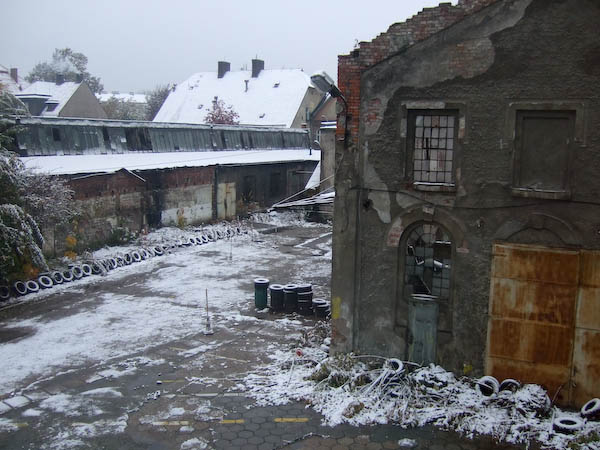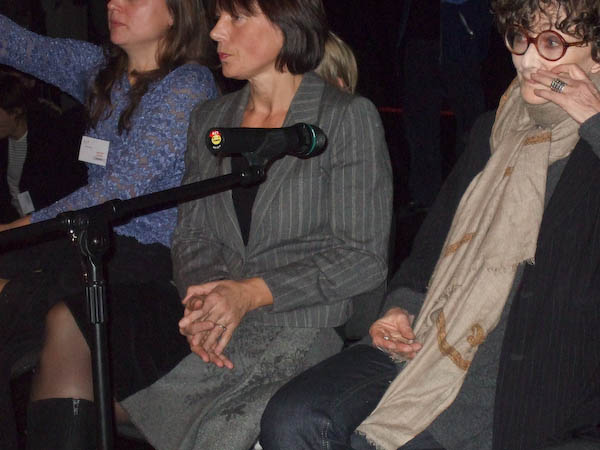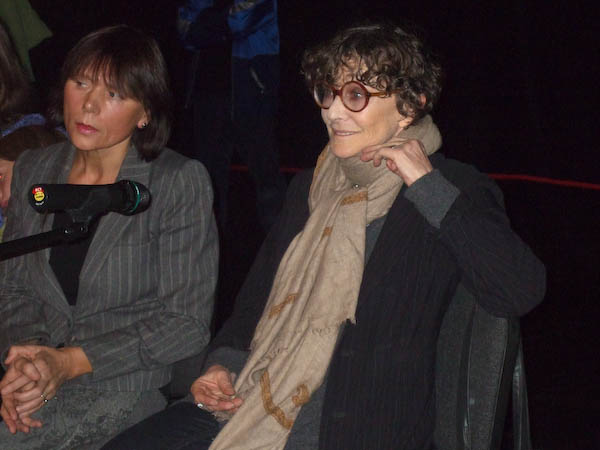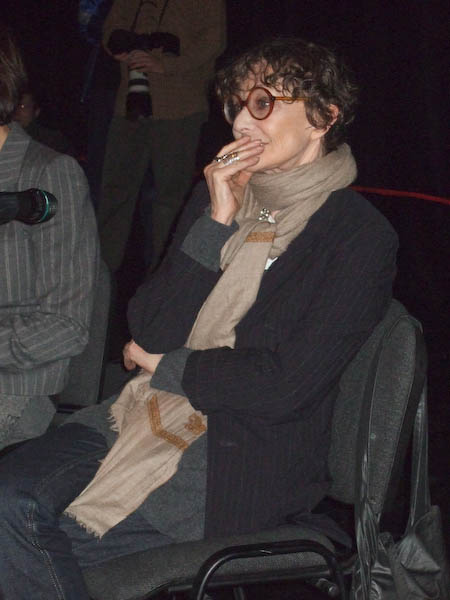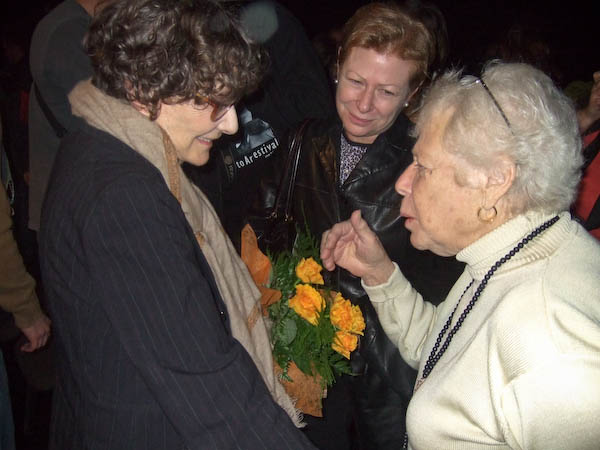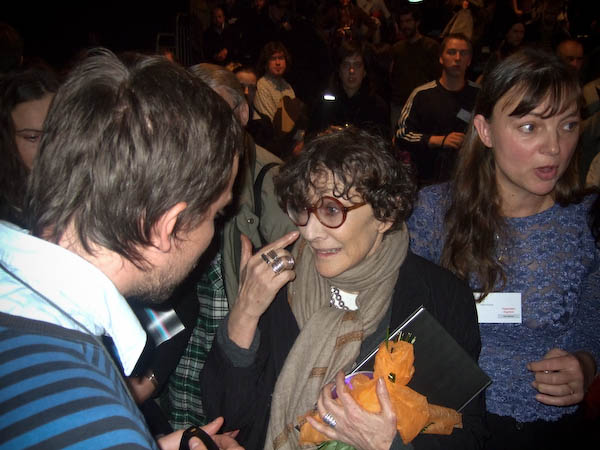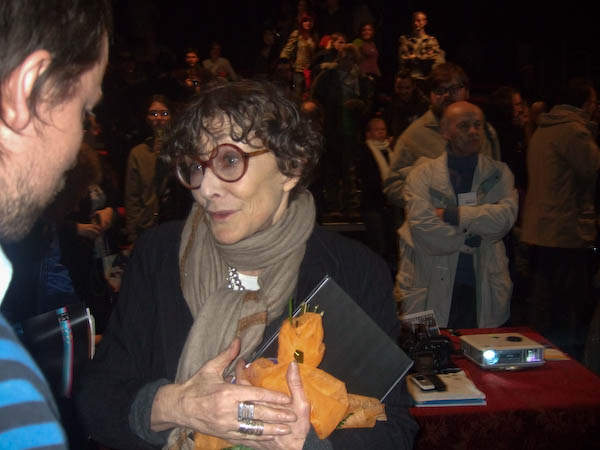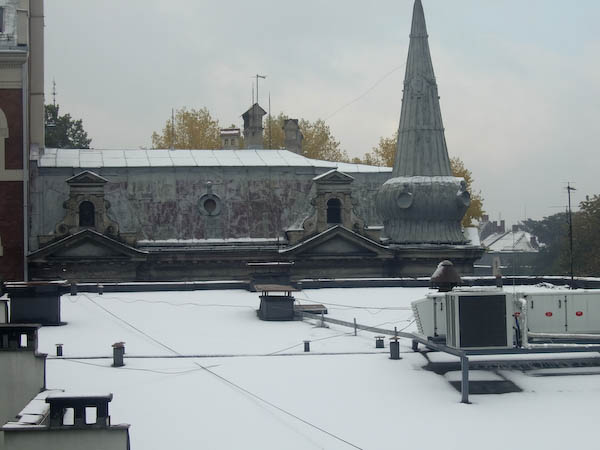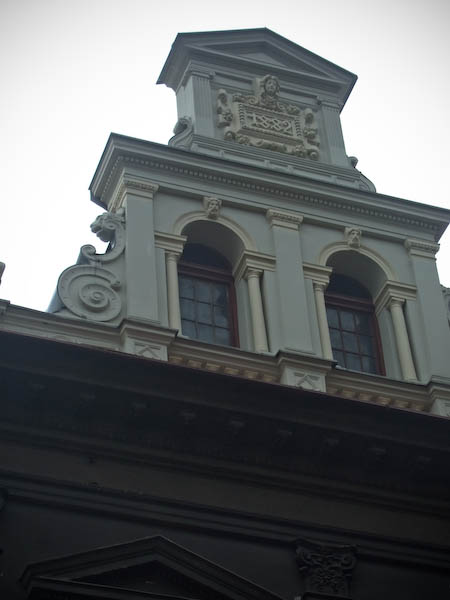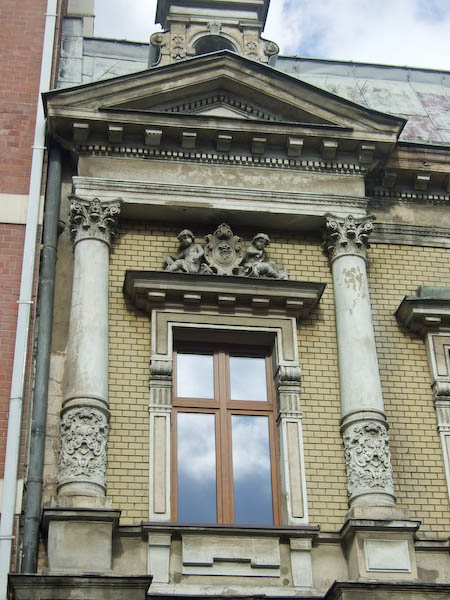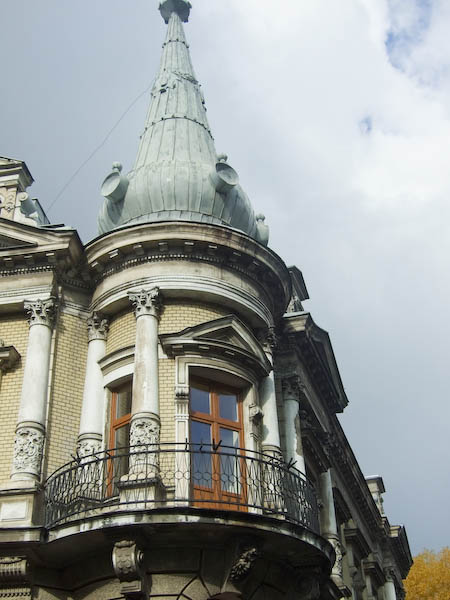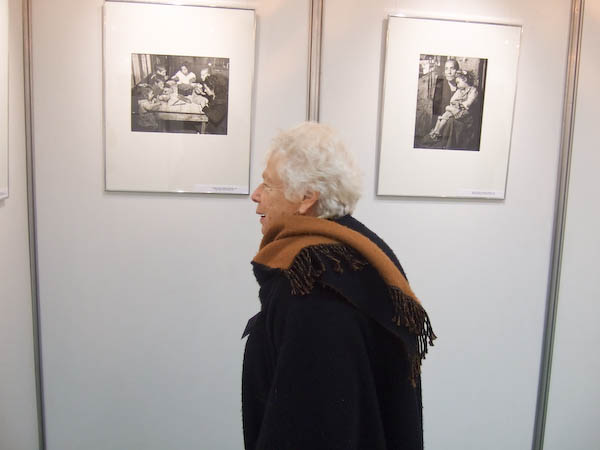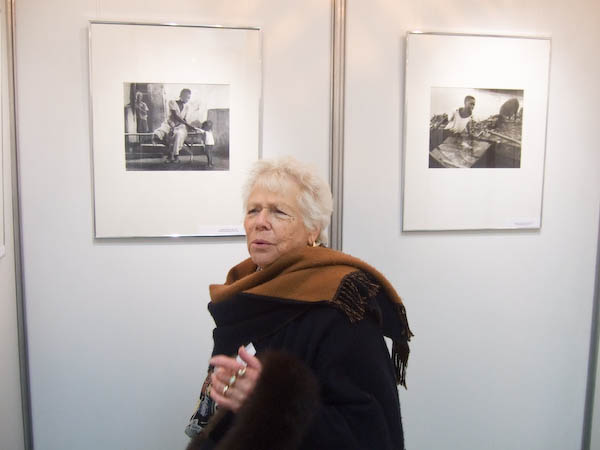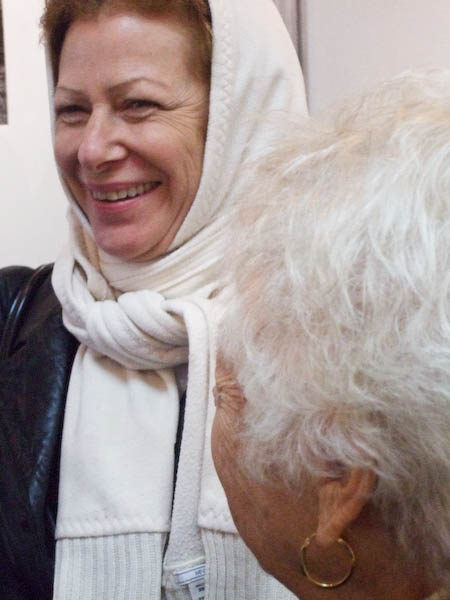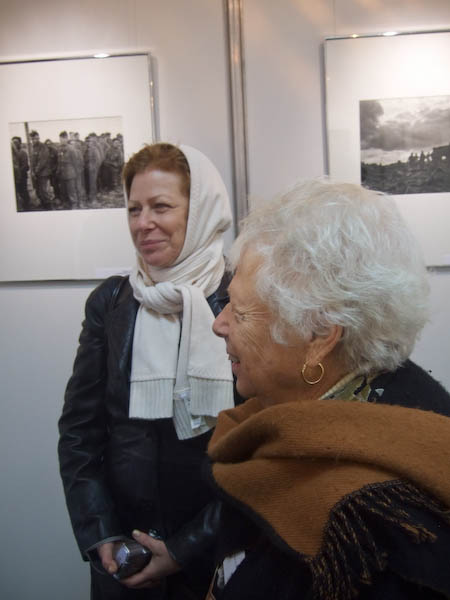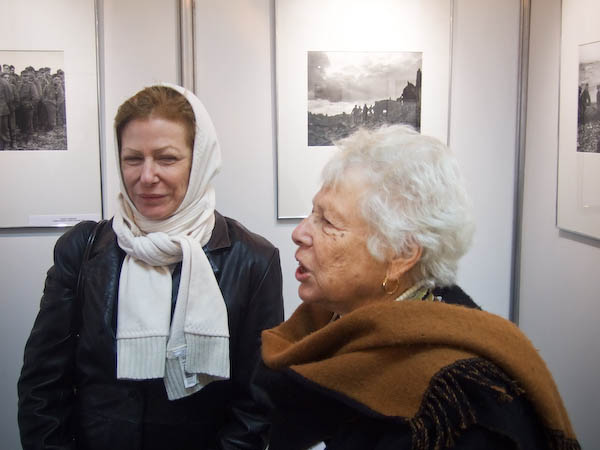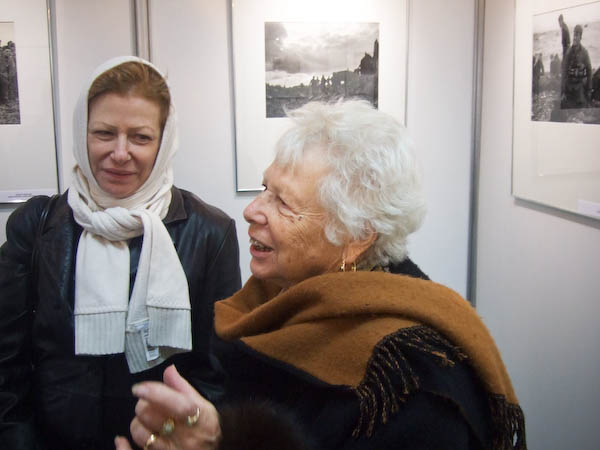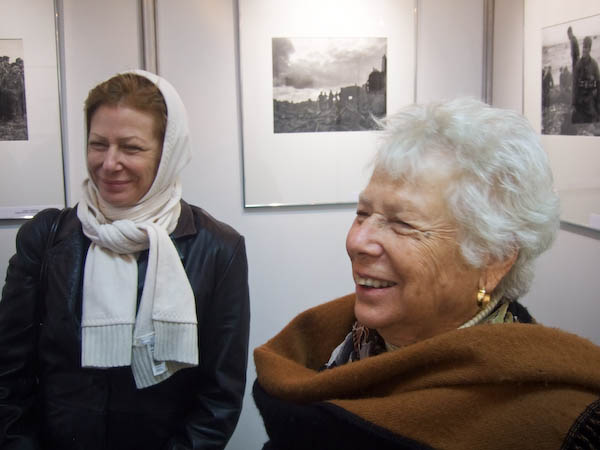FotoArtFestival 2007
Saturday morning I wake up, go to the window and everything is a little
white. However it is a busy morning and my alarm didn't go off, so I
don't have time to take any pictures of Bielsko in the snow, but have to
rush down to get breakfast in before the start of the 'Authors
Marathon.'
Sarah Moon, who will speak first is just about
finishing her breakfast as I arrive, and we all wish her well as she
leaves the table.
I walk to the Banialuka Theatre where the events are scheduled talking
to another couple of photographers; we are in a smaller hall there and
walk in to find it already crowded. Fortunately some chairs are found
for us at the side of the hall, as more people keep arriving.
By the time Sarah starts her talk, first showing a short film she made
about herself for an event the USA, the theatre was packed with many
standing. The film was short, rapid moving, with her fast-talking poetic
commentary and a rather poor sound system making it hard to follow even
though it was in English. But as with her work, what came over was a
strong feeling of atmosphere and mood, and the details were probably
unimportant.
The questions that followed brought out much of the outline of her
career and her methods of working. Despite her appreciation of the
things that digital can do for her, especially in making films and DVD,
her photographs are all made on film, using Polaroid neg/pos material,
which is shortly to cease production.
She is leaving immediately after the presentation, and at the end I go
to say goodbye. We embrace and hope we will meet again somewhere, and I
photograph her with some of the many others who want to speak to her
before she leaves.
Naomi Rosenblum asks me what I think about the screen
in the hall, which has obvious ripples across its surface. She isn't
happy about projecting documentary photographs or Nina's film on to it,
and I suggest she asks Inez if it can be made flat.
The only solution appears to be to move proceedings into the larger
theatre that was used for the opening, but this leads to a considerable
delay. The next item on the program, a meeting about the Union
of Polish Artist Photographers (UPAP) goes ahead as planned,
but after that there is a gap of a couple of hours before the programme
can restart.
I'm sufficiently interested to find out more about UPAP to remain in
the meeting, but more than half the Polish audience were apparently
students who had only come to see Sarah Moon and although the hall was
still decently full, there was plenty of space.
The meeting was chaired by Witold Krassowski, the
Vice President of the UPAP, and was to explain some of the reasons
behind its change to the Association of Polish Art
Photographers (APAP), as well as outline how this might
channel European Union cultural funds to photographers. I hope I have
the important details right - but it was a little hard to follow even in
English.
The UPAP was celebrating its 60th anniversary, and had been used by the
communist regime to control photographers. Through it they supplied
money to photographers, but when the communists lost power the funding
stopped. The organisation carried on continuing to try to work for
photographers, running galleries, exhibitions and projects etc.
Moving to the new organisation, the APAP would mark a decisive break
from the old communist model. The aim was to make the APAP much easier
to join and to attract more young photographers. It would also continue
to support artists' rights, and provide a mechanism for recognising
individual photographers as artists which would give them access to
European cultural funds.
I ask what they mean by artists' rights am a little disappointed to
find they seemed only to have copyright in mind. Our right to that was
secured long since (although it would be nicer if some countries - such
as America - adhered more closely to the Berne Convention) although I
appreciate there can be some problems in actually getting the payment
due.
I'd hoped what was intended was a campaign to secure moral rights, and
in particular the right to be recognised - and attributed - as the
author of the work, along with a recognition of the integrity of the
work which should prevent images being cropped or otherwise altered
without the photographer's consent.
Its always easy to think that the grass is greener on the other side of
the hill. Earlier, I think someone had asked Sarah what could be done to
raise the profile of Polish photography. I think probably he meant on
the international scene, but certainly inside Poland photography appears
to have a much higher profile than it does in many other countries -
such as the UK.
Here we don't really have any organisation that stands up and
represents British photographers rights. We have several organisations
that each represents different sectors but no overall body. Which is
perhaps why the UK body that distributes cultural funds has been so
effectively able to shaft photographers.
Of course photographers do occasionally get some funding, but the great
bulk goes to galleries and other organisations - funding curators, other
gallery staff and premises - and and only small amounts trickle - often
through them - down to the photographers.
(Part of the problem has always been that the total amount for visual
arts in general has always been relatively small, and that for
photography a small fraction even of that, with huge amounts of subsidy
going into opera etc.)
Until I got a small commission - funded by a local authority and a
Regional Arts Council - in 2001, the total amount of public funding I
had received in almost 30 years as a photographer exhibiting and
publishing work had been less than £1000. And more of that money came
from the Poetry budget rather than any Photography budget, despite my
never having published a single verse!
This year I've taken part in 4 exhibitions in public spaces in the UK,
including one show of 24 pictures from 'My London Diary' and
another which I curated. Two, possibly three of the venues get some
public support, but for various reasons I've not qualified for any
direct public funding.
Back to Poland. After the UPAP/APAP meeting I went to the gallery next
door for some coffee, which gave me the opportunity to talk to Mitra
Tabrizian and her husband, who I'd met at the opening the
previous day. I'm not sure that what we said changed my ideas about her
work, but it did tell me more about her working methods and gave me a
little more insight into her way of thinking. She was to give the next
presentation, and they left to make the final presentations.
A few minutes later I decided to go and take my place in the hall, but
found a crowd still waiting outside. I stopped to talk to Naomi and
Nina, and their volunteer Eva came up to tell us we had at least an hour
to spare. They decided to go and take a look at Walter's show - as
although I'd already seen it, I would welcome another look.
So five minutes later I was going with them around the show, sharing
their delight at how well it had been displayed and lit, and being
delighted to hear some of the stories behind some of the pictures, as
well as sharing my appreciation of the work.
While in the Ksiaznica Beskidska we also went round the Michael
Kenna show. Again, I'd already seen this - and written in my
diary about it - but was gratified to find that we seemed largely in
agreement about the work.
It was a mood of agreement that continued as we sat in the theatre and
listened to MItra's presentation, and when after a listening to it and a
number of questions a move to the Prezydent for lunch was suggested we
were all ready.
(continued on next page.)
